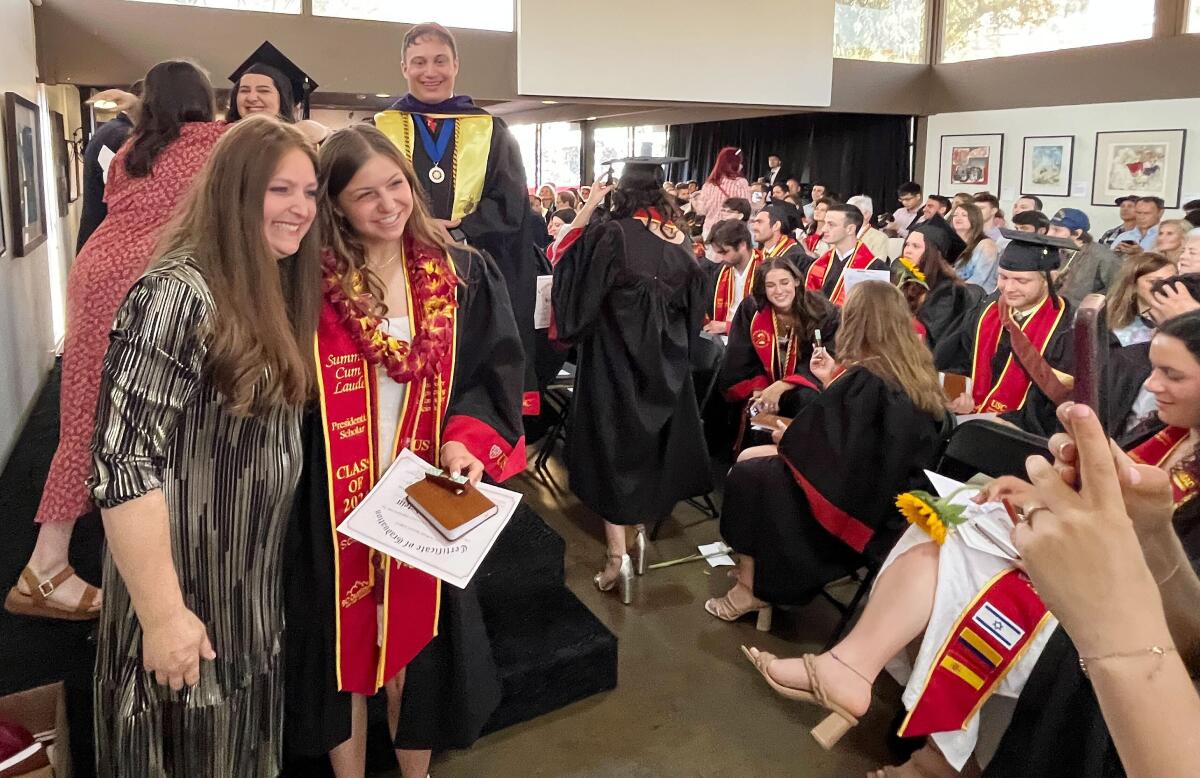After USC canceled graduation, Jewish students held their own ceremony

- Share via
When USC canceled the main-stage commencement ceremony, Jewish leaders on campus saw an opportunity.
Before about 19,000 graduates walked across stages on Friday to receive their degrees in smaller school satellite ceremonies, USC’s Hillel hosted a graduation event for Jewish students and their families — a moment to gather in unity amid weeks of campus turmoil over Israel-Hamas war protests.
“A lot of people have been trying to take these joyful moments away from us,” said Mark Rayant, 26, who was earning his master’s degree in green technology. “We get to come together as a community in a safe environment, in a healing environment — something the university wasn’t able to provide.”
At USC’s Hillel center, a post-and-beam building next door to the university’s Catholic student center, more than 50 students attended in their black robes and red sashes along with 200 or so family, friends, professors and classmates.
Stress and anger had punctuated the weeks leading up to graduation. After senior Asna Tabassum was named valedictorian, on- and off-campus Jewish groups pointed out that she had linked to a pro-Palestinian website on her Instagram page.
As controversy intensified, USC canceled Tabassum’s speaking slot, after the university received threats related to the Instagram account. Then USC canceled the main graduation ceremony amid pro-Palestinian encampments on campus that ended with two police sweeps and arrests. USC also canceled the interdenominational baccalaureate ceremony Thursday night.
Dave Cohn, executive director of USC Hillel, acknowledged that the year has ended under a “very, very dark cloud.”
“No matter how you view these issues — as a person of Jewish identity or as a person in general — there’s no denying this depleted and depressed the atmosphere,” Cohn said.
And so Friday, families trickled in starting at 8:15 a.m. while private security guards stood sentry.
“We have nosh in the atrium,” Rachael Cohen, assistant director of Hillel, told graduates and their families. She pointed to bagels, stacks of doughnuts and coffee in the courtyard.
Cohen said the morning was a “silver lining” for Jewish students. About 2,000 undergraduates and as many graduate students are Jewish — about 10% of the student body — and Hillel is a sanctuary for many, she said, a place of acceptance and belonging.
USC’s Jewish community is hardly a monolith, including Jews who are Persian, Israeli, Latino and Ashkenazi, who have more European roots.
Jewish students at USC have been among those protesting in support of Palestinians and calling for the university to boycott and divest from financial ties to Israel. And Jewish students have embraced their own meanings of Zionism at the university, finding a deeper connection to Israel.
“It’s an ongoing conversation about how we best support our campus,” Cohen said. “Two thousand Jews means 2,000 opinions. And no two Jews are the same.”
After attendees took their seats, Cohn urged graduates to never let hostility define them.
“We face losses and pains as a campus community, but the spirit of our ambition as Trojans empowers us to transcend those painful moments,” he said.
Rayant, the engineering graduate student, said he had felt the sting of antisemitism before Hamas attacked Israel on Oct. 7. He was troubled by how it had intensified since — including last week, when he found a swastika scrawled on a brick post by campus.
“I’m not an advocate. I’m an engineer … but sometimes you need to tell the truth,” he said. Rayant would later attend the same engineering ceremony where Tabassum, the valedictorian, would receive her diploma.
“Hopefully no one will spit at me today,” said Sabrina Jahan, 22, who was earning her undergraduate diploma in business. Jahan said she was spit at during a Seder table last month. She said she’s been called “baby killer” and other names.
“We’re used to it, as unfortunate as it is to say, but I’m very proud of who I am,” said Jahan, who had an Israeli flag on her red sash. She was critical of how USC administrators had not quickly stopped encampments of pro-Palestinian students from taking over parts of campus. “At the end of the day, they were ultimately able to handle it in a strategic way … and I appreciate that.”
The unrest on campus and reports of antisemitism unsettled Shirel Stemmons, who monitored the news with her husband, Robert, from their home in London. Their son Jake graduated Friday.
“We were always going to come and be here with our son,” said Robert Stemmons. “We were just hoping things could be peaceful — not resolved — so this important ceremony could continue.”
Shirel Stemmons said there were times when she worried about her son, the only of the couple’s four children to attend college in the U.S.
“It doesn’t help being thousands of miles away,” she said. “But he was reassuring; he felt supported,” which she credited to Hillel.
Jake Stemmons agreed that he felt physically safe — but many friends did not. He acknowledged that he has sometimes felt unease.
“Things were said that made me unwelcome in certain spaces,” said Jake Stemmons, who is working as a consultant in San Francisco this summer and wants to be an entrepreneur in the education field.
The surprise speaker at the ceremony was actress and former “Jeopardy!” host Mayim Bialik, who addressed students by video.
“What a four years you’ve had,” she said, summing up how the pandemic and Israel-Hamas war had bookended their studies.
“This past year in particular has been a real challenge, but this is life. This is your life,” Bialik said. “You’ve had to shine brighter than you’d thought you’d have to … and you’ve had to be engaged leaders and defenders.”
More to Read
Sign up for Essential California
The most important California stories and recommendations in your inbox every morning.
You may occasionally receive promotional content from the Los Angeles Times.











